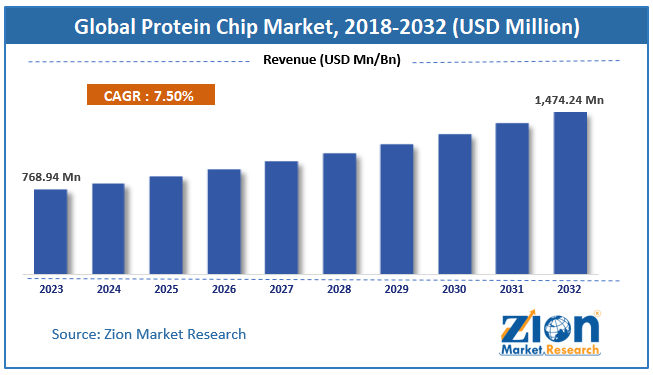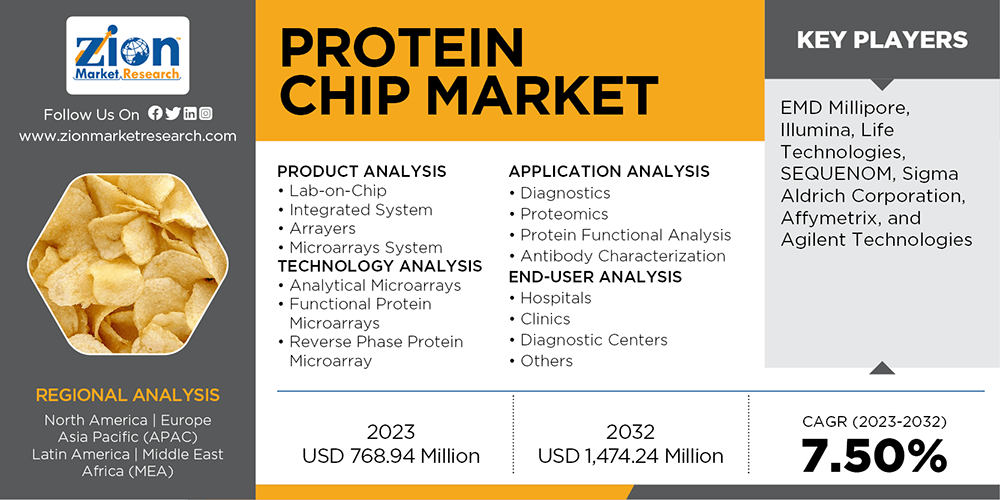Protein Chip Market Size, Share, Trends, Growth 2032

Protein Chip Market By Product (Lab-On-Chip, Integrated System, Arrayers, and Microarrays System), By Technology (Analytical Microarrays, Functional Protein Microarrays, and Reverse Phase Protein Microarray), By Application (Diagnostics, Proteomics, Protein Functional Analysis, and Antibody Characterization), and By End-User (Hospitals, Clinics, Diagnostic Centers, and Others), And By Region - Global And Regional Industry Overview, Market Intelligence, Comprehensive Analysis, Historical Data, And Forecasts 2024 - 2032-
| Market Size in 2023 | Market Forecast in 2032 | CAGR (in %) | Base Year |
|---|---|---|---|
| USD 768.94 Million | USD 1,474.24 Million | 7.50% | 2023 |
Protein Chip Industry Prospective:
The global protein chip market size was evaluated at $768.94 million in 2023 and is slated to hit $1,474.24 million by the end of 2032 with a CAGR of nearly 7.50% between 2024 and 2032.
The report covers a forecast and an analysis of the protein chip market on a global and regional level. The study provides historical data from 2018 to 2022 along with a forecast from 2024 to 2032 based on revenue (USD Million). The study includes the drivers and restraints of the protein chip market and their impact on the demand over the forecast period. Additionally, the report includes the study of opportunities available in the protein chip market on a global level.
Protein Chip Market: Growth Factors
Protein chip or protein array is a high-performance method for detecting proteins, investigating protein functions, and monitoring their amount of expression. In basic research and biotechnology companies, protein arrays are the commonly used technology. The protein array concept involves the use of proteins on a surface comprising glass, membranes, microtiter wells, mass spectrometer beads, and plates. The array also includes sample molecules labeled with a fluorescent dye. The sample emits a fluorescent signal while reacting with immobilized proteins. A laser scanner can read this fluorescent signal.
The major drivers of the protein chip market are the growing demand for personalized medicine and strong proteomics R&D investments. Other growth drivers are increasing cancer incidence rates and the rising practice of diagnostic testing with advanced technology. The protein chip market is plagued with difficulties in various critical aspects, particularly in high-throughput protein production. It is a scientific experimentation technique that involves screening big compound libraries for activity against biological objectives via automation. In addition, protein chip determines the quality of the resulting protein microarrays, thus the quality of proteins must be considered as a crucial aspect.
In order to give a comprehensive view of the protein chip market, we have included a competitive landscape and an analysis of Porter’s Five Forces Model for the market. The study encompasses a market attractiveness analysis, wherein all the segments are benchmarked based on their market size, growth rate, and general attractiveness.
The report provides company market share analysis to give a broader overview of the key players in the market. In addition, the report also covers key strategic developments of the market including acquisitions & mergers, new technology launch, agreements, partnerships, collaborations & joint ventures, R&D, and regional expansion of major participants involved in the market on a global and regional basis.
Protein Chip Market : Report Scope
| Report Attributes | Report Details |
|---|---|
| Report Name | Protein Chip Market Research Report |
| Market Size in 2023 | USD 768.94 Million |
| Market Forecast in 2032 | USD 1,474.24 Million |
| Growth Rate | CAGR of 7.50% |
| Number of Pages | 215 |
| Key Companies Covered | EMD Millipore, Illumina, Life Technologies, SEQUENOM, Sigma Aldrich Corporation, Affymetrix, and Agilent Technologies |
| Segments Covered | By Product, By Technology, By Application, By End-User and By Region |
| Regions Covered | North America, Europe, Asia Pacific (APAC), Latin America, Middle East, and Africa (MEA) |
| Base Year | 2023 |
| Historical Year | 2018 to 2022 |
| Forecast Year | 2024 - 2032 |
| Customization Scope | Avail customized purchase options to meet your exact research needs. Request For Customization |
Protein Chip Market: Segmentation
The protein chip market is segmented based on the product, technology, application, end-user, and region.
By product, the protein chip market is categorized into integrated system, lab-on-chip, microarrays system, arrayers, and others. Proteins are identified after capturing antibodies using direct protein labeling, to show analytical microarrays using analyte labeled assay format. There is another model sandwich assay format that detects multiple variations in protein expression in epithelial and stromal cells via this analyte labeled antibody array. Two distinct antibodies are used in this format to identify the targeted protein. The reverse stage protein microarray enables the assessment of many samples acquired by identifying tissue, cell lysates, or even fractionated cell lysates directly on a glass slide at distinct locations.
By technology, the protein chip market includes functional protein microarrays, reverse phase protein microarray, and analytical microarrays. The application segment comprises antibody characterization, diagnostics, protein functional analysis, and proteomics. The proteomics segment dominates the protein chip market, as they are used in biomedical research and drug discovery studies based on conduction chips. The end-user segment includes clinics, hospitals, diagnostic centers, and others.
Protein Chip Market: Regional Insights
The regional segment is divided into North America, Europe, Latin America, Asia Pacific, and the Middle East and Africa.
North America and Europe dominate the worldwide protein chip market, due to the high demand for molecular-based diagnostic methods and increased health-consciousness among the patient population. The Asia Pacific is an evolving protein chip market, owing to various economic developments witnessed in India, China, and Malaysia. In addition, due to the region’s diverse demographic pool, most drug development businesses outsource their clinical trial drug development research to Asian nations, which is also contributing to the development of this region's protein chip market.
Protein Chip Market: Competitive Space
The global protein chip market profiles key players such as :
- EMD Millipore
- Illumina
- Life Technologies
- SEQUENOM
- Sigma Aldrich Corporation
- Affymetrix
- Agilent Technologies
This report segments the global protein chip market into:
Global Protein Chip Market: Product Analysis
- Lab-on-Chip
- Integrated System
- Arrayers
- Microarrays System
Global Protein Chip Market: Technology Analysis
- Analytical Microarrays
- Functional Protein Microarrays
- Reverse Phase Protein Microarray
Global Protein Chip Market: Application Analysis
- Diagnostics
- Proteomics
- Protein Functional Analysis
- Antibody Characterization
Global Protein Chip Market: End-User Analysis
- Hospitals
- Clinics
- Diagnostic Centers
- Others
Global Protein Chip Market: Regional Analysis
- North America
- The U.S.
- Europe
- UK
- France
- Germany
- Asia Pacific
- China
- Japan
- India
- Latin America
- Brazil
- Middle East and Africa
Table Of Content
Methodology
FrequentlyAsked Questions
Protein microarrays, or protein chips, are potent instruments utilized in proteomics, the study of proteins. It operates in a manner akin to DNA microarrays; however, proteins are immobilized onto a solid substrate, such as a silicon chip or glass slide, rather than DNA sequences. Protein nanoparticles facilitate the analysis of protein modifications, protein expression levels, and protein interactions in a sample at a high throughput. In areas including drug discovery, disease diagnosis, and the comprehension of cellular signaling pathways, they are especially beneficial.
Protein chip technology advancements, including enhanced sensitivity, increased throughput, and improved multiplexing capabilities, stimulate market expansion by facilitating more comprehensive and efficient protein analysis. The increasing need for targeted therapies and personalized medicine, which are dependent on the detection of particular protein biomarkers, drives the implementation of protein sensors for the validation and discovery of biomarkers.
The global protein chip market size was evaluated at $768.94 million in 2023 and is slated to hit $1,474.24 million by the end of 2032.
The global protein chip market with a CAGR of nearly 7.50% between 2024 and 2032.
The regional segment is divided into North America, Europe, Latin America, Asia Pacific, and the Middle East and Africa.
EMD Millipore, Illumina, Life Technologies, SEQUENOM, Sigma Aldrich Corporation, Affymetrix, and Agilent Technologies
RelatedNews
HappyClients
Zion Market Research
Tel: +1 (302) 444-0166
USA/Canada Toll Free No.+1 (855) 465-4651
3rd Floor,
Mrunal Paradise, Opp Maharaja Hotel,
Pimple Gurav, Pune 411061,
Maharashtra, India
Phone No +91 7768 006 007, +91 7768 006 008
US OFFICE NO +1 (302) 444-0166
US/CAN TOLL FREE +1 (855) 465-4651
Email: sales@zionmarketresearch.com
We have secured system to process your transaction.
Our support available to help you 24 hours a day, five days a week.
Monday - Friday: 9AM - 6PM
Saturday - Sunday: Closed







